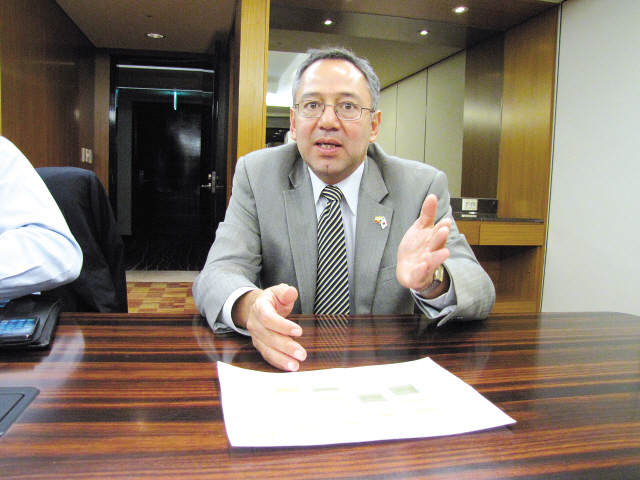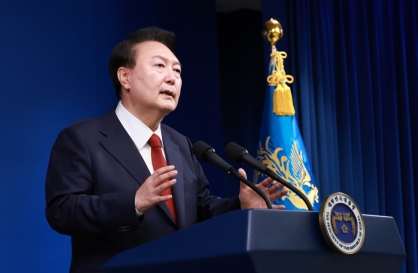With Korea as a strategic partner, Ecuador is poised to embark on its most ambitious infrastructure project ever, a so-called “city of knowledge” on the edge of the Amazon Rainforest.
Yachay, which means “to learn” in the indigenous Quechuan language, will become a hybrid urban center, with equal parts science and technology cluster, free economic zone and educational complex.
Minister of Knowledge and Human Talent Augusto Espinosa, who arrived in Korea on Monday for a week of consultations and meetings with a slew of government officials and experts, said he believed the project would transform his country ― home of the Galapagos Islands a key habitat for Charles Darwin’s development of the theory of evolution ― into a regional powerhouse for research, learning and innovation.
Yachay could become Latin America’s Silicon Valley of the Andes.
Ecuador initially signed MOUs with Incheon and the Incheon Free Economic Zone in September 2010, modeled somewhat on Daejeon’s Daedeok Innopolis where KAIST is located.
After Ecuadorian President Rafael Correa inaugurates his third term, the country’s National Assembly is expected to approve legislation to set aside $300 million for the project. The rest could come from investment and strategic partnerships abroad, Espinosa said.
“We are undergoing a process of change. We understand that to complete this change successfully we need to revamp our educational system,” Espinosa said in an interview with the Korea Herald Wednesday.
“It requires us to create innovation and processes that will enable us to systematically create added value. Our partnership with Korea on this project is one of the ways we can do this.”
Yachay, which means “to learn” in the indigenous Quechuan language, will become a hybrid urban center, with equal parts science and technology cluster, free economic zone and educational complex.
Minister of Knowledge and Human Talent Augusto Espinosa, who arrived in Korea on Monday for a week of consultations and meetings with a slew of government officials and experts, said he believed the project would transform his country ― home of the Galapagos Islands a key habitat for Charles Darwin’s development of the theory of evolution ― into a regional powerhouse for research, learning and innovation.
Yachay could become Latin America’s Silicon Valley of the Andes.
Ecuador initially signed MOUs with Incheon and the Incheon Free Economic Zone in September 2010, modeled somewhat on Daejeon’s Daedeok Innopolis where KAIST is located.
After Ecuadorian President Rafael Correa inaugurates his third term, the country’s National Assembly is expected to approve legislation to set aside $300 million for the project. The rest could come from investment and strategic partnerships abroad, Espinosa said.
“We are undergoing a process of change. We understand that to complete this change successfully we need to revamp our educational system,” Espinosa said in an interview with the Korea Herald Wednesday.
“It requires us to create innovation and processes that will enable us to systematically create added value. Our partnership with Korea on this project is one of the ways we can do this.”

Ecuador’s future “City of Knowledge” will be developed on 4,000 hectares in the northeastern corner of the country on the edge of the Amazon rainforest and the border of Peru for about $4 billion.
Yachay will become a science and technology metropolis and home to four universities, scores of research and production laboratories and a matrix of supporting industrial, commercial residential facilities.
It will focus on five research areas: life sciences; nanotechnology; petrochemistry; renewable energies and climate change; and information and communication technologies.
“Korea with its advanced technology can be a great partner with Ecuador to identify and explore the biodiversity of Ecuador and find solutions to challenges that face not only Ecuadorians and Koreans, but also mankind in general,” said Espinosa who became his country’s knowledge minister in April 2012.
The idea is to transform the tiny country sandwiched between the Pacific Ocean and the Amazon rainforest into an Andean brain trust that will see future innovations born, nurtured, produced and sent to market.
It is not a new idea. Some 25 percent of pharmaceuticals are derived from rainforest ingredients, but just 1 percent of the world’s tropical trees and plants have actually been tested by scientists, according to the American Association of Animal Science.
That leaves a lot to be uncovered.
A group of researchers from Yale University reported in 2012 the discovery of fungi that “eats” polyurethane, a type of plastic. The discovery could have massive implications for waste management systems. Most of the world’s trash is plastic.
It also exemplifies the Amazon’s “green gold” and underscores the reason for Espinosa’s enthusiasm for Yachay.
“Through Ecuador’s diversity in plant and animal species, bioscience and biotechnology between Ecuador and Korea can be worked on jointly to find solution for things such as a fungus in the rainforest that dissolves plastic.”
Beyond finding solution to world waste management challenges, government planners might be more focused on the immediate challenge of diversifying its economy to safeguard growth in the long term. Modernizing its infrastructure is a keystone to diversifying the economy and future growth.
Right now the Ecuadorian economy relies on its energy sector for about half its total export revenue. Broadly speaking, Ecuador is an economy dependent on exploiting primary resources, such as oil, minerals and agricultural products like bananas and cut flowers.
Since taking office in 2007, Correa’s government has spent heavily on social measures, education, health and transportation including highways and a newly minted $600 million airport.
Yachay marks Correa’s most ambitious infrastructure project yet.
Ecuadorian Ambassador to Korea Nicolas Trujillo said Correa’s stable leadership helped make these long-term projects possible.
“At the end of this term of office in 2017, Correa will have served 10 years as president. To give you some perspective, Ecuador had seven presidents in the previous 10 years,” Trujillo said. “The stability and continuity Correa provided has made long-term infrastructure projects like this one possible. These programs have created a better environment for the country, and regionally as a member of Latin America.”
Espinosa said Yachay would be the first such science and technology cluster in Latin America.
Instead of tapping oil deposits under the Yasuni National Forest, Ecuador could secure future revenues by tapping the undiscovered pharmaceutical potential hidden in the Amazon, he said.
By Philip Iglauer (ephilip2011@heraldcorp.com)
-
Articles by Korea Herald










![[K-pop’s dilemma] Time, profit pressures work against originality](http://res.heraldm.com/phpwas/restmb_idxmake.php?idx=644&simg=/content/image/2024/05/08/20240508050705_0.jpg&u=20240508171126)








![[Today’s K-pop] Stray Kids to drop new album in July: report](http://res.heraldm.com/phpwas/restmb_idxmake.php?idx=642&simg=/content/image/2024/05/09/20240509050659_0.jpg&u=)